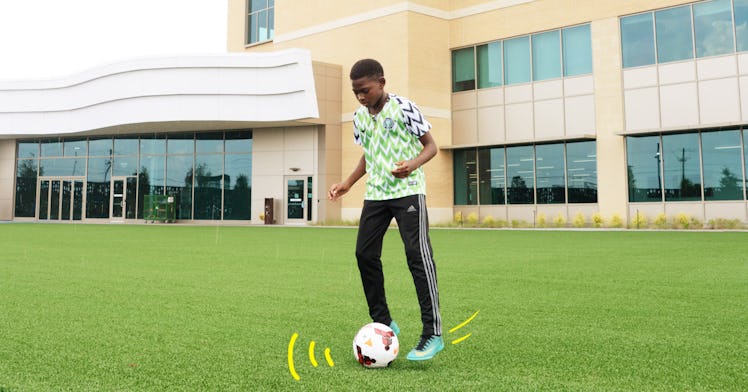What Parents of Young Athletes Need to Know About Concussion Recovery
When young athletes suffer from a concussion, there is one area of their recovery parents should pay close attention to.

The following was produced in partnership with Texas Scottish Rite Hospital for Children.
Quality sleep is key for all kids and teens, as it helps their developing brains and bodies function properly. But according to a new study from Texas Scottish Rite Hospital for Children, sufficient, sound sleep may be extra critical for those who’ve suffered a concussion while playing sports. They found that young athletes with good sleep quality were more likely to recover from a sport-related concussion within two weeks, while those with poor sleep quality tended to take 30 days or more to fully recover.
Young athletes who’ve been dealt a sport-related concussion may experience any combination of physical, cognitive and emotional symptoms. These may include headache, dizziness, trouble focusing, fuzzy memory, balance issues, anxiety, sadness and sleep difficulties. “Many may feel drowsy, sleep more than usual, have trouble falling asleep or wake up multiple times during the night,” says Jane S. Chung, M.D., a pediatric sports medicine physician at Scottish Rite Hospital and lead researcher of the study.
Typically, these symptoms subside rather quickly, but for some, they can linger for several weeks or more. Also, if a kid is prone to migraines or has a history of anxiety or depression, a concussion may exacerbate those symptoms, and their recovery could take even longer. So, what is one area parents can focus on to help with recovery after a sport-related concussion? Focus on sleep.
Sleep quality is not only important for physical, mental and cognitive well-being in young athletes, but it also plays an important role in the recovery of the brain following a sport-related concussion.
As trusted experts in healing muscles, joints and bones, the physicians and researchers from the hospital’s Center for Excellence in Sports Medicine understand the vital importance of sleep in injury recovery, as studies show it helps young athletes’ muscles and tissues repair and rejuvenate.
This is why Chung and lead research coordinator Aaron Zynda wanted to look further into the importance of sleep in recovery following sport-related concussions. Their study was performed as part of a larger multi-center project called “ConTex”, which involves Scottish Rite Hospital, UT Southwestern Medical Center and other institutions in North Texas. Funding for ConTex was provided by the Texas Institute for Brain Injury and Repair.
At their initial clinic visit and three-months later, each kid filled out a sleep-assessment questionnaire. The questionnaire asked how many hours they slept per night, how frequently they woke up, how long it took them to fall asleep, whether they felt drowsy during the day, whether they relied on sleep medication and more. Based on their responses, 261 athletes were classified as good-quality sleepers, while 95 were considered poor-quality sleepers. Those with poor sleep quality slept fewer than seven hours a night, needed at least 30 minutes to drift off, couldn’t stay asleep, needed sleep meds and experienced daytime drowsiness, among other issues.
The athletes also reported their concussion symptoms at the initial clinic visit and three-month follow-up. Those with healthy sleep habits fared significantly better following a concussion than the kids who struggled with sleep. The poor-quality sleepers reported two times worse symptoms at the time of diagnosis and, although improved, were still worse than those of the good-quality sleepers at their three-month follow-up.
“Our study shows that sleep quality is not only important for physical, mental and cognitive well-being in young athletes, but it also plays an important role in the recovery of the brain following a sport-related concussion,” Zynda says.
We spend a lot of time educating parents on good sleep hygiene, including setting a schedule for bedtime and wake time and sticking to it, even on the weekends.
With this new data, Chung encourages clinicians to always assess kids’ and teens’ sleep patterns when evaluating them after a sport-related concussion and to talk with young athletes about the importance of sleep in injury recovery. The emphasis on sleep is already an integral part of the recovery plans for concussion management at Scottish Rite Hospital. As leaders in educating families about the critical link between sleep and recovery, Chung and her colleagues have these discussions regularly.
“When evaluating young athletes for concussions, we spend a lot of time educating parents on good sleep hygiene,” she says. “This includes setting a schedule for bedtime and wake time and sticking to it, even on the weekends.” The goal, according to sleep experts, is eight to ten hours of sleep a night for teenagers and nine to twelve hours a night for younger kids.
“It’s also important to create a healthy sleep environment,” Chung adds. “Make sure the bedtime area is quiet, comfortable, dark, cool and free of disturbances. This also means avoiding electronics at least one hour before bedtime. Parents can also help kids establish a pre-bedtime routine. Whether that’s reading a book or taking a warm bath, it’s a time of relaxation that tells their brain it’s time to wind down and get ready for bed.”